| dc.contributor.author | Pandora, Katherine | |
| dc.date.accessioned | 2019-10-18T07:28:09Z | |
| dc.date.available | 2019-10-18T07:28:09Z | |
| dc.date.issued | 2001-09 | |
| dc.identifier.citation | Katherine Pandora, "Knowledge Held in Common: Tales of Luther Burbank and Science in the American Vernacular," Isis 92, no. 3 (Sep., 2001): 484-516 | en_US |
| dc.identifier.uri | https://hdl.handle.net/11244/321498 | |
| dc.description.abstract | During the first half of the twentieth century, the horticulturist Luther Burbank was largely considered an irrelevant figure by the scientific community, despite winning acclaim from the public as an eminent scientist. In examining the intellectual, social, and political claims embedded in texts by and about Burbank, this essay argues that consideration of the Burbank stories as they circulated in the vernacular realm can aid historians in understanding the dynamics of science in American life. Among the themes it addresses are how the Burbank stories directly engaged the question of who should legitimately count as a student of nature; the varied philosophical perspectives that derived from siting science within the domestic sphere; and how these stories played with the possibility of a philosophy of nature based on the concept of "living matter," as opposed to one grounded on mechanistic principles. The essay also discusses how Burbank's views on evolution were mediated by the image of the child and the way in which his convictions regarding the power of the environment to release latent characteristics in physiological material presented a view of the future of the American "race" that was at odds with conventional eugenic thinking and assigned a central role to women in the drama of American evolution. | en_US |
| dc.language | en | en_US |
| dc.subject | History of Science | en_US |
| dc.subject | History, United States. | en_US |
| dc.subject | American Studies | en_US |
| dc.title | Knowledge Held in Common: Tales of Luther Burbank and Science in the American Vernacular | en_US |
| dc.type | Article | en_US |
| dc.description.peerreview | Yes | en_US |
| dc.description.peerreviewnotes | Reviewed by referees selected by the Journal Editor | en_US |
| dc.identifier.doi | https://doi.org/10.1086/385279 | en_US |
| ou.group | College of Arts and Sciences::Department of History of Science | en_US |
